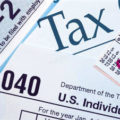Financial Focus: Donald Trump has not paid taxes in 3 decades; He’s a genius!
Just like personal itemized tax deductions and credits — all designed to lower our income and allowing us to pay less or, in some cases, no taxes — business deductions and credits work exactly the same way. These business deductions, from labor to employee benefits to writing off or selling business property, lower one’s tax obligations. In the business world, tax savings are used to re-invest and/or spend on your business.
According to The New York Times report, Donald Trump has been aggressively writing off his business losses, especially in the areas of “selling property” since 1995. He has not paid any federal taxes and has been able to carry over his losses for 20 years which allowed him to apply for low Income State Tax credits, such as the STAR Tax credit. Is it legal? Again, isn’t that why you hire a tax person in the first place: to find the legal methods — not loopholes — that allow to you to lower your tax liability as much as possible.
So, how exactly does “selling property” lower your business taxes?
The IRS Form 4797, Sales of Business Property is where you would report:
- The sale or exchange of property
- The involuntary conversion of property and capital assets
- The disposition of noncapital assets
- The disposition of capital assets not reported on Schedule D
- The gain or loss for partners and S corporation shareholders from certain section 179 property dispositions by partnerships and S corporations
- The computation of recapture amounts under sections 179 and 280F(b)(2) when the business use of section 179 or listed property decreases to 50% or less
- Gains or losses treated as ordinary gains or losses, if you are a trader in securities or commodities and made a mark-to-market election under Internal Revenue Code section 475(f).
You can elect to recover all or part of the cost of certain qualifying property, up to a limit, by deducting it in the year you place the property in service. This is the section 179 deduction. You can elect the section 179 deduction instead of recovering the cost by taking depreciation deductions.
Business Income Limit. The total cost you can deduct each year after you apply the dollar limit is limited to the taxable income from the active conduct of any trade or business during the year. Generally, you are considered to actively conduct a trade or business if you meaningfully participate in the management or operations of the trade or business.
Any cost not deductible in one year under section 179 because of this limit can be carried to the next year. Special rules apply to a 2015 deduction of qualified section 179 real property that is disallowed because of the business income limit.
Taxable income. In general, figure taxable income for this purpose by totaling the net income and losses from all trades and businesses you actively conducted during the year. Net income or loss from a trade or business includes the following items.
- Section 1231 gains (or losses)
- Interest from working capital of your trade or business
- Wages, salaries, tips, or other pay earned as an employee.
In addition, figure taxable income without regard to any of the following.
- The section 179 deduction
- The self-employment tax deduction
- Any net operating loss carryback or carry forward
- Any unreimbursed employee business expenses
Carryover of disallowed deduction. You can carry over for an unlimited number of years the cost of any section 179 property you elected to expense but were unable to because of the business income limit. This disallowed deduction amount is shown on Form 4562. You use the amount you carry over to determine your section 179 deduction in the next year.
If you place more than one property in service in a year, you can select the properties for which all or a part of the costs will be carried forward. Your selections must be shown in your books and records. For this purpose, treat section 179 costs allocated from a partnership or an S corporation as one item of section 179 property. If you do not make a selection, the total carryover will be allocated equally among the properties you elected to expense for the year.
If costs from more than one year are carried forward to a subsequent year in which only part of the total carryover can be deducted, you must deduct the costs being carried forward from the earliest year first.
Special rules for qualified section 179 real property. You can carry over a prior deduction attributable to qualified section 179 real property that you elected to expense but were unable to take because of the business income limitation.
Based on the very little information we have about Donald Trump’s income, we know that by deducting his “business losses by depreciation and 179 expensing,” Trump was able to lower his Gross Income substantially — to a loss!
Does that make him a tax cheat? Does that mean Trump skirted paying taxes? Does this make Trump, his accountant or his wife, Melania (who his accountant claims paid more attention in meetings than Trump did) a genius?
I won’t comment on the above questions. I will tell you not to expect tax miracles similar to Donald Trump.
Anthony Rivieccio is the founder & the CEO of The Financial Advisors Group, celebrating its 20thyearasafee-only financial planning firm specializing in solving financial problems. Anthony, a recognized financial expert since 1986, has been featured by many national and local media including: Klipingers Personal Finance, The New York Post, News12 The Bronx, Bloomberg News Radio, Bronxnet, The Norwood News, The West Side Manhattan Gazette, Labor Press Magazine, Financial Planning Magazine, WINS 1010 Radio, The Bronx News and The Bronx Chronicle.
For financial assistance or a FREE 2016 Investment Analysis. Anthony can be reached at (347) 575 5045.
















Follow Us